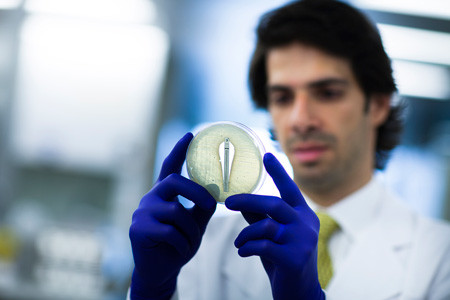Phantom Superbug in Middle East Could Spread Worldwide
Monday, 02 June, 2014

 A phantom superbug in the Middle East is cloaking itself in genetic material to avoid detection and placing the population at increased risk of deadly infections.
A phantom superbug in the Middle East is cloaking itself in genetic material to avoid detection and placing the population at increased risk of deadly infections.
University of Queensland Researchers who discovered the n antibiotic-resistant bacteria warn the hard-to-detect superbugs may quickly spread beyond the region and emerge worldwide.
Researcher Hosam Mamoon Zowawi (pictured right), from the UQ Centre for Clinical Research, said the ‘phantom’ superbugs were found during a region-wide collaborative study on superbugs in the Gulf Cooperation Council (GCC) states of Saudi Arabia, United Arab Emirates, Kuwait, Qatar, Oman and Bahrain.
“The study found antibiotic-resistant bacteria in samples from all GCC states,” Mr Zowawi said.
“Not only were the bacteria widespread, but they were found to be carrying genetic material which empowers them to resist antibiotics and avoid detection in routine laboratory testing.
“This means patients are not being treated quickly with the right antibiotics, allowing the bacteria time to spread.
“The results of this study will hopefully encourage laboratories to introduce more specific testing techniques to identify and prevent overlooking the presence of phantom superbugs.
“Implementing effective infection control precautions is also essential to minimise the spread of superbugs.
“Several clusters of the phantom superbugs were also detected in different patients from the same hospitals, suggesting patient-to-patient spread of infection is occurring,” Mr Zowawi said.
The research team is now developing new diagnostic techniques to rapidly identify antibiotic-resistant bacteria, including the phantom superbug.
“We hope this will help in advancing the surveillance of superbugs by reducing the turnaround time to identify the deadly bacteria,” Mr Zowawi said.
“It will also assist clinicians to apply targeted treatment and implement infection control precautions sooner.”
The research findings are published in this month's Antimicrobials Agents and Chemotherapy journal
National Allied Health Workforce Strategy: a lasting reprieve?
Hospital + Healthcare speaks with Chief Allied Health Officer Anita Hobson-Powell,...
ADHA accelerates connected care for allied health
After attracting substantial interest from software vendors, the Australian Digital Health Agency...
South Australia gains its first fully rural medical degree
Designed to address the critical shortage of doctors in regional, rural and remote areas,...









